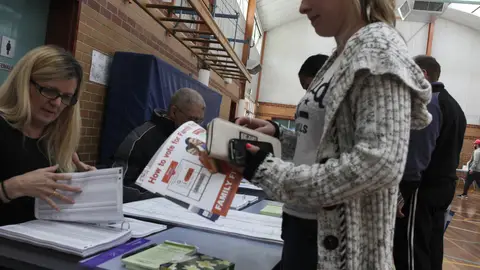378,000 Trans People Could Face Voter Disenfranchisement in November

In an election where LGBTQ voter turnout could decide the presidency, a new report is suggesting that as many a third of transgender voters could face barriers to voting in November.
An estimated 965,350 transgender adults will be eligible to vote in the 2020 general election, but more than 378,000 of them could face problems voting because their identification doesn’t reflect their name and/or gender, according to a new report by The Williams Institute at the UCLA School of Law.
Additionally, 81,000 of them live in states with strict voter ID laws that require voters to show a driver’s license or other government ID. Those states are Kansas, Indiana, Tennessee, Virginia, Alabama, Georgia, Wisconsin, and Mississippi.
The calculations take into account transgender population counts in each state and voting laws. They also break down reports of ID discrimination from the 2015 U.S. Transgender Survey.
“When voting at the polls, election officials and poll workers are the ones who decide whether the voter in front of them is the person on the voter registration rolls,” said study co-author Jody L. Herman, in a statement. “Especially in states that require an ID to be shown, this could result in some transgender voters being disenfranchised.”
The U.S. Transgender Survey found that just 68% of trans people did not have an ID that reflected their name and pronouns.
“Transgender people often face substantial challenges to obtaining accurate identification,” said lead author Kathryn O’Neill, in a statement. “The requirements for updating the name and gender on official IDs vary widely across states, and the process can be complex and costly.”
Even in states without strict voter ID laws, transgender voters have faced substantial barriers. In 2018, transgender Vermonter Sade Viscaria was blocked from voting in the first gubernatorial race with a transgender candidate because a poll worker in Burlington refused to accept the gender marker on her ID.
“She discriminated against me for being transgender and [accused] me of having a fake ID,” Viscaria told Grindr’s now-defunct LGBTQ outlet INTO at the time. “She thought my name was fake.”
Even California is wary of such incidents. The state is in the midst of training all of its poll workers on transgender sensitivity in order to combat transgender voter suppression.





